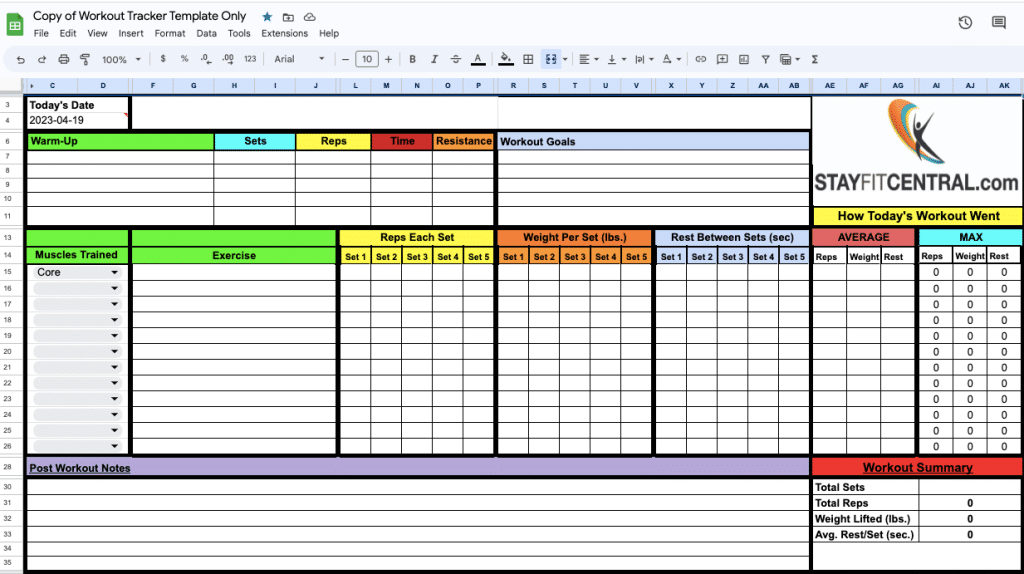Workout Tracker
5 Ways Taking Notes After Lifting Will Help You
I’ve been lifting weights for a long time. Before the invention of the web browser. Yep, that long. I’ve completed thousands of workouts and until very recently I never, ever thought about taking notes after lifting weights.
What a bummer.
This year I started to spend 5 or so minutes after my workout jotting down a few notes. I write whatever comes to mind. Things like whether or not I reached my goals, how much energy I had during a set, and what to improve.
The results have been pretty great. I’m staying more focused during my workouts and doing a better job and applying what I learn from my notes to my workouts. An example is a note I made to myself to do more rotational exercises. Writing this down made sure that I took action.
I’ve been doing all sorts of rotational exercises as a result of this note and am continuing to see positive results. Doing exercises like windmills and rotational lunges have eliminated my shoulder and neck pain and really strengthened my core.
Still not convinced? Here are 5 reasons that explain why you record your thoughts post-workout.

The Benefits Of Taking Notes After Lifting Weights
1. It Helps Track Your Progress
You’re already recording every set, rep, and weight used in your workout tracker. All that information is necessary to measure how your workouts are going and plan what you’re going to do next.
When you write a few sentences down in your training log to accompany this information you get the benefit of adding insight to your workout data. What’s this mean? Let me explain with an example.
Say you did 5 sets of 5 reps of front squats today. You focused on keeping our core tight and moving the bar as fast as possible while going from the bottom of the squat to standing up straight. As a result you set a new PR, increasing your squat by 20 lbs.
When you write down a few notes about what worked on you gain insight into what helped you set the PR. You also have a record for when you review your workout tracker sometime in the future. Seeing it then helps you know what you did that helped set this PR. Just having the weight you lifted doesn’t give you any context.
2. They Help You Customize Your Workouts
Your lifting workout notes become a personalized playbook that guides your future workouts. By reviewing the notes you’ve taken after lifting, you gain insights into things like: technique adjustments you made, and what needs more attention.
When you have this information you’ll be more informed and able to design a more effective workout that addresses the points you’ve made in your notes.
Here’s an example. Let’s say you notice that your lack of shoulder mobility is hurting your ability to get stronger at overhead presses. Seeing this written down in your journal will prompt you to include exercises that improve shoulder mobility like windmills and arm bars in your next workouts. Now your workout is working to help you.
Here’s a free spreadsheet workout tracker to record your post-workout notes along with every exercise, set, and rep you.
3.Your Notes Keeps Small Problems From Becoming Huge
Taking notes after you train can be instrumental in keeping injuries and other issues from getting out of hand to the point that you can’t work out.
By writing down any discomfort, pain, or ‘tweaks’ you’re feeling you can get on top of them before they’re a real problem. I don’t know why but seeing it in writing or on a spreadsheet helps me take action. Doing this has kept me from missing workouts and being able to train every day.
Doing this doesn’t just help prevent problems due to a tweaked muscle. It’s a great way to improve your exercise technique. I always write down a few things about how I performed each exercise. If I write down that I need to use my glutes more to power through kettlebell swings I’m more likely to do it next time.
Another potential problem your notes help avoid overtraining or as it’s also known, under recovering. If you see that you’re regularly writing that you don’t have enough energy to train and are always sore it’s easier to acknowledge that you need to do something to recover better between workouts.

4. Taking Notes After Lifting Is Motivating
Writing down your accomplishments after working out serves as a powerful motivator. Right then and in the future.
Celebrating achievements, no matter how small, boosts self-confidence and reinforces the belief that progress is being made. Reviewing your wins and reflecting on successful experiences is very uplifting, before a workout and during times of doubt when you just can’t seem to make progress.
Just write it down. Whether you do more pull ups than ever before, squat past parallel without taking your heels off the floor, or do something else that’s important to you. This is a win, even when it isn’t something you may normally consider to be that big a deal.
When you need some motivation reading these things in your post-workout notes will help. I promise.
5. Taking Notes After Lifting Weights Keeps You Accountable
Keeping notes holds you accountable to yourself. By documenting your workouts, you establish a sense of commitment and discipline. When faced with a blank page, you are reminded of your dedication to your goals, creating a psychological contract with yourself. This accountability helps you maintain consistency, stay focused, and adhere to your training plan, leading to long-term success.
Taking Notes After Lifting Is A Game Changer
It doesn’t take much effort or time but I promise you’ll find it helps. Even if you never look at your notes again. I can’t explain it and don’t really understand. That’s okay. Thinking about and writing down how my workout went helps me do the right things consistently. And it only takes 5 minutes. Give it a month and let me know how it’s worked for you.

